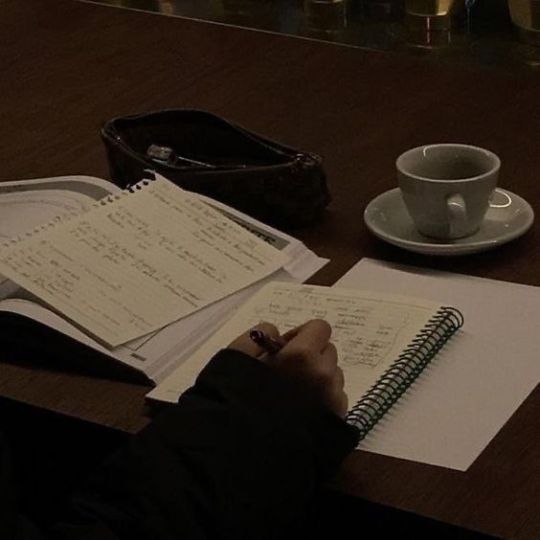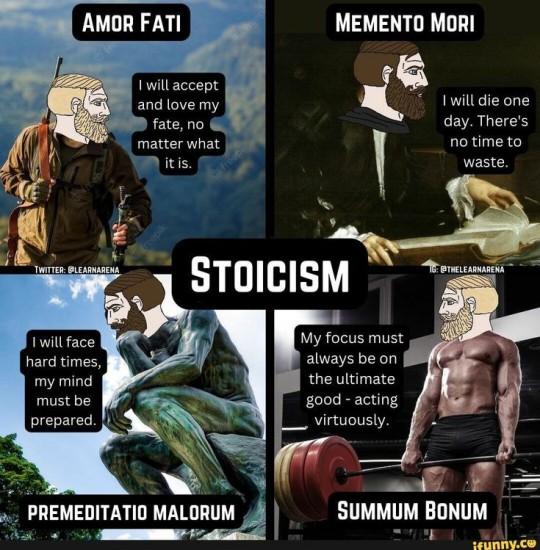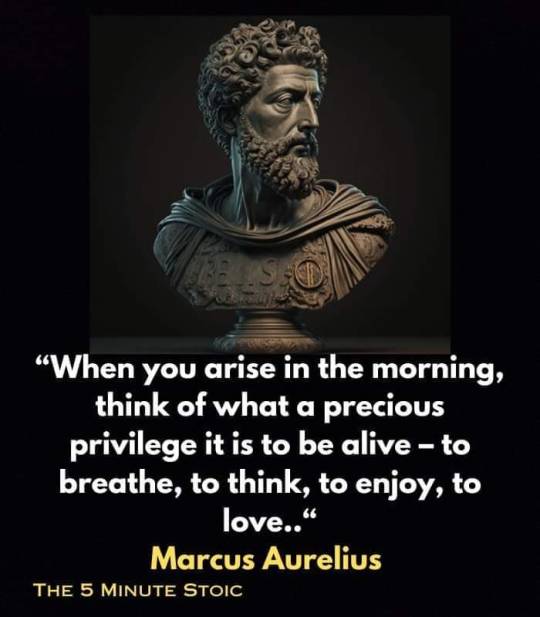#Stoic Philosophy
Text
"You become what you give your attention to."
Epictetus
#quotes#life quotes#literature#quoteoftheday#life#booklr#relatable quotes#book quotes#bookworm#thoughts#wisdom#words#stoic philosophy#stoicism#epictetus#greek quotes#metaphysical#mindset#philosophy#writeblr#writing#thinking#spilled thoughts#books#qotd#art
2K notes
·
View notes
Text
Core Stoic Principles ✨
Stoicism is a universal approach to ethics, personal growth, and resilience. The core teachings of Stoicism focus on the development of our personal virtue, the practice of reason, and the pursuit of wisdom to live a fulfilling and peaceful life.
Understanding What is Within Our Control: Recognizing the difference between what we can control (our thoughts, emotions, and actions) and what we cannot (external events, the actions of others) is central to Stoic philosophy. Focusing on our internal states rather than external circumstances which can lead you to a more peaceful and productive life.
Living Virtuously: Living according to virtue is the only good. Wisdom, courage, justice, and temperance are central to leading a good life.
Practicing Mindfulness and Self Reflection: This involves reflecting on your thoughts, emotions, and actions to understand them better and align them with rational thinking.
Acceptance: Accepting things as they come, without distress, and understanding the natural flow of life can lead to inner peace. This acceptance is not passive resignation but an emotionally balanced way.
Emotional Regulation: Stoics believe in facing challenges head on with a calm and composed mindset, learning from experiences, and not being overwhelmed by our emotions.
Community: Stoicism teaches the importance of living in harmony with others and contributing to the common good. Focusing on the idea that we are part of a larger community and as a result we should be advocating for actions that benefit society as a whole.
#stoicmindset#stoicquotes#stoicphilosophy#stoicism#stoic philosophy#personal improvement#personal development#personal growth#emotional intelligence#level up journey#glow up tips#becoming that girl#it girl#success mindset#growth mindset#positive mindset#self help#self awareness#self improvement#self reflection#self love#dream girl
438 notes
·
View notes
Text



“ vindica te tibi „ – and what we should learn from an old stoic like Seneca
if you have ever studied latin or philosophy, you will certainly have stumbled upon Seneca, a very problematic dude who, however, occasionally said the right things.
“ vindica te tibi „ is my all-time-favorite latin quote, it litterally means “ vindicate yourself for yourself „, but we can translate it better with “ take control of yourself „. in order to deeply understand this statement, let's take a look at stoic philosophy.
stoicism [ from latin stōicus and ancient greek Στωϊκός ( stōïkós ) ]: it’s a philosophy designed to make us more resilient, happier, more virtuous and more wise and – as a result – better people, better parents and better professionals. it is a philosophical and spiritual current with a rational (human rationality is the basis of everything), pantheistic (everything is God, God is everywere, the whole universe is God), deterministic (nothing happens by chance but everything is regulated by precise logical laws), and dogmatic (all that is, as being, is real and concrete) imprint, with a strong ethical and tendentially optimistic orientation. stoicism was founded in Athens around 300 bc by Zeno of Citium and later it was introduced to rome by Panaetius of Rhodes in the 2nd century bc. stoicism is a tool in the pursuit of self-mastery, perseverance, and wisdom: something one uses to live a great life, rather than some esoteric field of academic inquiry. [ sources wikipedia and dailystoic ]
Seneca was a stoic philosopher who lived in rome in the 1st century ad, and he wrote this quote in a letter addressed to Lucilus, a friend of his much younger than him, interested in philosophy and politics.
in this letter ( the first of his epistolary ) he deals with the theme of time and the brevity of life, a subject that he would often return to in many of his works. basically Seneca claims that life isn't actually that short, as the majority of people complain, we're just very good at waste our time beign slaves of something, instead of using it wisley. there are many ways people waste their time, he calls them " the busy ones ", those people who spend their energies on useless business and relationships, which lead neither to their personal growth nor to an economic, social or psychological advantage, just because they're used to it.
Seneca is saying that we are so used to wasting time, doing certain things just because we have been taught to do so, that we don't realize that we could do much more for ourselves and for our enviroment if we only knew how to use our time correctly.
" vindica te tibi " means that you have to take control of your time, because no one can give it back to you. your future depends on the investment in yourself and in your time, your future and who you are as a person is up to you. take control of yourself.
#college#education#school#academia#note taking#student#study aesthetic#study blog#study inspiration#study motivation#stoicism#stoic philosophy#seneca#lucius annaeus seneca#chaotic academia#academic validation#light academia#dark academia#latin#philosophy#study notes#study tips#studyblr#studyinspo#studyspo#uni life#university life#university
136 notes
·
View notes
Text
“Accept death in a cheerful spirit, as nothing but the dissolution of the elements from which each living thing is composed. If it doesn't hurt the individual elements to change continually into one another, why are people afraid of all of them changing and separating? It's a natural thing. And nothing natural is evil.”
- Marcus Aurelius
#literature#roman emperor#marcus aurelius#meditations of marcus aurelius#stoic philosophy#stoics#stoicism
316 notes
·
View notes
Text

#simple man#manliness#simple life#traditional gender roles#christian manhood#traditional manhood#chivalry#traditional man#tradblr#gentleman#stoicism#stoic philosophy#summun bonum#premeditatio malorum#amor#amor fati#memento mori
496 notes
·
View notes
Text

Gratitude makes the soul, mind, and body stronger
#stoicmindset#stoic philosophy#stoicism#quote of the month#motivating quotes#life quotes#quotes#life lessons#life#gratitude
95 notes
·
View notes
Text

“As the sun does not wait for prayers and incantations to rise, but shines forth and is welcomed by all: so you also should not wait for clapping of hands and shouts and praise to do your duty; but do good of your own accord, and you will be loved like the sun.”
― Epictetus, Fragments
#Epictetus#Philosophy#Perennial Philosophy#ancient wisdom for modern times#stoic philosophy#stoicism
132 notes
·
View notes
Text

Do not act as if you had ten thousand years to throw away. Death walks with you arm-in-arm. Be good while you live and when you can.
Every morning remind yourself:
"Today I have meetings with argument, pettiness, disloyalty, greed, evil and selfishness."
Greet them with a smile.
~ Marcus Aurelius
#buddha#buddhist#buddhism#dharma#sangha#mahayana#zen#milarepa#tibetan buddhism#thich nhat hanh#marcus aurelius#stoicism#stoic philosophy
22 notes
·
View notes
Text
“True happiness is to enjoy the present, without anxious dependence upon the future, not to amuse ourselves with either hopes or fears but to rest satisfied with what we have, which is sufficient, for he that is so wants nothing. The greatest blessings of mankind are within us and within our reach. A wise man is content with his lot, whatever it may be, without wishing for what he has not.”
—Seneca
#satisfaction#seneca#spirituality#expand your consciousness#stoic quotes#stoicmindset#stoicphilosophy#stoicism#mind stuff#present moment#daily stoic#stoic philosophy#perceptions#perception#change your perspective#positive thinking#perspective#philosophy#philosophical#self awareness#self actualization#self care#self help#self improvement#self healing#self acceptation#conscious awareness#spiritual awareness#awareness#live in the now
62 notes
·
View notes
Text

36 notes
·
View notes
Text

Consumer Zombies
#wake up#a e s t h e t i c#aesthetics#aesthetic#art#stoic philosophy#stoicism#sigma#digital art#imax#hollywood#cinephile#cinema#consumerism
17 notes
·
View notes
Text
The happiness of your life depends on the quality of your thoughts
- Marcus Aurelius
#mindset#high vibration#marcus aurelius#quotes of wisdom#philosophy#law of vibration#psychology#shadow work#stoicism#stoic philosophy#philosophy quotes#psychology quotes#jungian psychology#positive psychology#spiritual wisdom#spiritual path#spiritual development#spiritual vibrations#spiritual healing#spiritual quotes
38 notes
·
View notes
Text
Men are born soft and supple;
dead, they are stiff and hard.
Plants are born tender and pliant;
dead, they are brittle and dry.
Thus, whoever is stiff and inflexible
is a disciple of death.
Whoever is soft and yielding
is a disciple of life.
The hard and stiff will be broken.
The soft and supple will prevail.
— Lao Tzu, Tao Te Ching
#philosophy#stoic philosophy#stoicism#tao te ching#lao tzu#wisdom#words of wisdom#quotes#life quotes
10 notes
·
View notes
Text

#simple man#manliness#simple life#traditional gender roles#christian manhood#traditional manhood#chivalry#tradblr#traditional man#gentleman#martial arts#isometric exercises#cold plunge#cold exposure#stoicism#stoic philosophy#mens sana in corpore sano#mental training
39 notes
·
View notes
Text

It is good to wake up and set your rules for happiness low. You wake up, you can breathe, you can move, you have people in your life... maybe even a cat or dog. Here's to you
#stoicism#stoicmindset#stoic philosophy#motivation#life quotes#truth#quotes#motivating quotes#quotes of the day
20 notes
·
View notes
